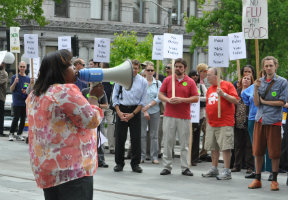 Natasha learned about the Seattle paid sick days campaign while working at a major grocery store in 2010. Although workers earned paid sick days, she says, “it was almost unusable; you had to be sick for three consecutive days to receive your sick pay.“ Because Natasha was the sole income earner for her family, she often worked ill.
Natasha learned about the Seattle paid sick days campaign while working at a major grocery store in 2010. Although workers earned paid sick days, she says, “it was almost unusable; you had to be sick for three consecutive days to receive your sick pay.“ Because Natasha was the sole income earner for her family, she often worked ill.
Natasha became involved when her union representative asked her to share her story. “I always felt like our sick leave policy was an issue,” she said, “but it took someone asking me to get involved before I realized there were a lot of people who felt the same way.” After that she told her story “to anyone who would listen, to city council, to union members, at rally’s, on community panel discussions, on the news. I believe I gave a face and a voice to the cause. It was the voice of a woman, a mother, a worker, a person of color, and a student. It helped people connect with the issue.”
Being a part of this movement meant the world to Natasha. “It restored my faith in the ability of individuals to impact systemic change. It was comforting to know that so many people were fighting to make sure that everyone had access to this basic human right. Being a part of this campaign helped my find my voice and recognize that I have power and that power can change things for the better.”